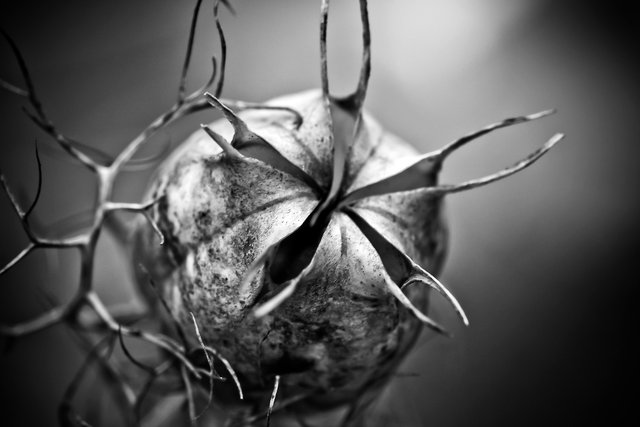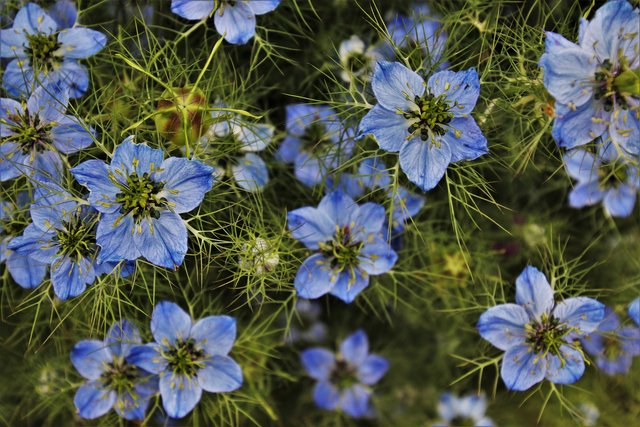An ancient catch-all every parent should know
Nigella Sativa, kalonji, black cumin, kalojeere, black caraway. Many names for this exciting plant but don’t get too excited about the Sativa part, this plant isn’t recreational.
Topping out at the discrete size of 12 inches or 30cm it has delicate foliage and is native throughout the Middle East and Northern Africa, although it has spread globally since then.
If you like flower gardens odds are you have seen this plant also known as Love-in-a-mist.
The flowers come in white and blue with fat seed pods, and it’s these seeds where the greatest value is found.
It was so valued in ancient times that it is mentioned in the Torah, the Quran, and the Bible multiple times and given in offerings to the Abrahamic God.
Taking a step back in time let us revisit the sands and pyramids of Egypt where entire fields of the flowers could be seen annually. Physicians of the time insisted it be kept in the home to treat many ailments. Bottles of the oil have been found in Pharoah’s tombs, so great was the value that it must be brought into the afterlife in case of their need.
Kalonji was considered a part of daily life for many people for any infection, stomach complaint, or headache. It was also part of the beauty routines of Cleopatra and Nefertiti, it’s quite likely the oil was used by many other women for the same reasons at the time.
It’s also a common ingredient in several ethnic cuisines. The seeds are frequently added to the mix of spices that make up various curries, different types of bread, and a couple of types of cheese.
Modern research supports the bulk of the claimed medicinal benefits. If you read my post on my child’s epilepsy then you are already aware of the anti-seizure properties.
Some other benefits include strong anti-cancer properties, broadly antimicrobial including bacterial, viral, or fungal infections. Some research also shows painkilling and sedative effects, as well as benefiting those with diabetes.
The smell of the cold-pressed oil is very mild making it easy to use with sensitive children on cuts and scrapes. No legal barriers to accessing it for epileptics. Low price point.
All compelling reasons for any parent to keep this in their medicine cabinet.
Follow my socials!
Facebook
Instagram
Twitter
Youtube
https://www.sciencedirect.com/topics/medicine-and-dentistry/nigella-sativa





This post was shared in the Curation Collective Discord community for curators, and upvoted and resteemed by the @c-squared community account after manual review.
@c-squared runs a community witness. Please consider using one of your witness votes on us here
thanks!
What a glorious and pretty post! Feeding not just me herbal-hungry mind but also my wanderlust. Yes, there are so many plants that have incredible properties - and most of them much easier t get and much cheaper than CBD. Enjoyed - off to share it to the Nat Med post on facebook.
Also shared to the @c-squared curation community for helping you grow the audience for this important information.
Leading the curation trail for both @ecotrain & @eco-alex.
Together We’re Making This World A Better Place.
Click Here To Join the manually curated trail "@artemislives" to support quality eco-green content.
@ecoTrain
thanks!
I think there are nigella seeds available on Homesteaders Co-op from @sagescrub's shop Seeds of Abundance!
It's super pretty!
nice!
Yes I love it's architectural shape as well. The photo @pberry included looks crazy alien! I'm going to grow some this year. I keep reading posts and going 'ooh, I'll grow that' and I'm running out of space!!
Grow everything everywhere!
That's why coplanting and layering is so cool. In the same space, you can grow a tree, a bucket of Comfrey, and some funny vine stuff! Or whatever combination you can make up!
Posted using Partiko Android
Haha! Damn. I love kalonji (I call it that due to the Indian influence on Australia) - it's got such a distinctive taste and I put it on a lot of dishes from Indian to Turkish/Moorish dishes. I love how these herbs often date back to ancient cultures, proving their worth to humanity time and time again. I think that's why I find it so sad that we have forgotton such ancient lore. I love it on bread and on creamy potato base soups. I did have a whole book on black cummin somewhere - I should dig it out.
Thanks for sharing!
a whole book?!
Yes!!!!
Posted using Partiko Android
Are all Nigella the same species, specifically N. sativa? Is Love in a Mist the specific plant, or a relative?
Thanks!
They're not all the same, their appearances are all very similar however only N.Sativa is known for medicinal and culinary use https://en.wikipedia.org/wiki/Nigella
Nigella
Nigella is a genus of 18 species of annual plants in the family Ranunculaceae, native to southern Europe, north Africa, south and southwest Asia. Common names applied to members of this genus are nigella, devil-in-a-bush or love-in-a-mist.
The species grow to 20–90 cm tall, with finely divided leaves; the leaf segments are narrowly linear to threadlike. The flowers are white, yellow, pink, pale blue or pale purple, with five to 10 petals.
Thanks!